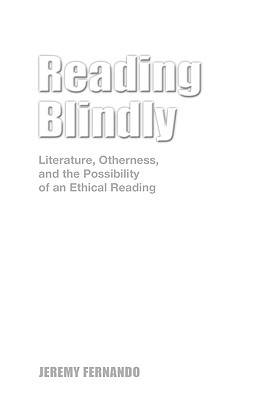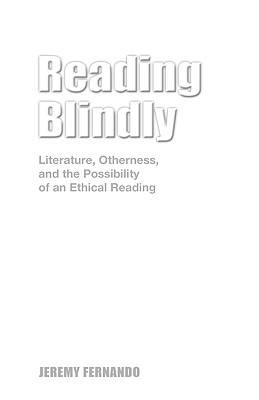
Door een staking bij bpost kan je online bestelling op dit moment iets langer onderweg zijn dan voorzien. Dringend iets nodig? Onze winkels ontvangen jou met open armen!
- Afhalen na 1 uur in een winkel met voorraad
- Gratis thuislevering in België vanaf € 30
- Ruim aanbod met 7 miljoen producten
Door een staking bij bpost kan je online bestelling op dit moment iets langer onderweg zijn dan voorzien. Dringend iets nodig? Onze winkels ontvangen jou met open armen!
- Afhalen na 1 uur in een winkel met voorraad
- Gratis thuislevering in België vanaf € 30
- Ruim aanbod met 7 miljoen producten
Zoeken
Reading Blindly
Literature, Otherness, and the Possibility of an Ethical Reading
Jeremy Fernando
Hardcover | Engels
€ 135,95
+ 271 punten
Omschrijving
Reading Blindly attempts to conceive of the possibility of an ethics of reading--"reading" being understood as the relation to an other that occurs prior to any semantic or formal identification, and therefore prior to any attempt at assimilating what is being read to the one who reads. Hence, "reading" can no longer be understood in the classical tradition of hermeneutics as a deciphering according to an established set of rules as this would only give a minimum of correspondence, or relation, between the reader, and what is read. In fact, "reading" can no longer be understood as an act, since an act by necessity would impose the rules of the reader upon the structure of what (s)he encounters; in other words the reader would impose herself upon the text. Since it is neither an act nor a rule-governed operation, "reading" needs to be thought as an event of an encounter with an other--and more precisely an other which is not the other as identified by the reader, but heterogeneous in relation to any identifying determination. Being an encounter with an undeterminable other--an other who is other than other--"reading" is hence an unconditional relation, a relation therefore to no fixed object of relation. Hence, "reading" can be claimed to be the ethical relation par excellence. Since "reading" is a pre-relational relationality, what the reader encounters, however, may only be encountered before any phenomenon: "reading" is hence a non-phenomenal event or even the event of the undoing of all phenomenality. This is a radical reconstitution of reading positing blindness as that which both allows reading to take place and is also its limit. As there is always an aspect of choice in reading--one has to choose to remain open to the possibility of the other-- Reading Blindly, by extension, is also a rethinking of ethics; constantly keeping in mind the impossibility of articulating an ethics which is not prescriptive. Hence, Reading Blindly is ultimately an attempt at the impossible: to speak of reading as an event. And since this is un-theorizable--lest it becomes a prescriptive theory-- Reading Blindly is the positing of reading as reading, through reading, where texts are read as a test site for reading itself. Ostensibly, Reading Blindly works at the intersections of literature and philosophy; and will interest readers who are concerned with either discipline. However as reading is re-constituted as a pre-relational relationality, it is also a re-thinking of communication itself--a rethinking of the space between; the medium in which all communication occurs--and by extension, the very possibility of communicating with each other, with another. As such, this work is, in the final gesture, a meditation on the finitude and exteriority in literature, philosophy--calling into question the very possibility of correspondence, and relationality--and hence knowledge itself. For all that can be posited is that reading first and foremost is an acknowledgement that the text is ultimately unknowable; where reading is positing, and which exposes itself to nothing--and is in fidelity to nothing--but the possibility of reading.
Specificaties
Betrokkenen
- Auteur(s):
- Uitgeverij:
Inhoud
- Aantal bladzijden:
- 192
- Taal:
- Engels
Eigenschappen
- Productcode (EAN):
- 9781604976335
- Verschijningsdatum:
- 28/09/2009
- Uitvoering:
- Hardcover
- Formaat:
- Genaaid
- Afmetingen:
- 140 mm x 216 mm
- Gewicht:
- 390 g

Alleen bij Standaard Boekhandel
+ 271 punten op je klantenkaart van Standaard Boekhandel
Beoordelingen
We publiceren alleen reviews die voldoen aan de voorwaarden voor reviews. Bekijk onze voorwaarden voor reviews.











